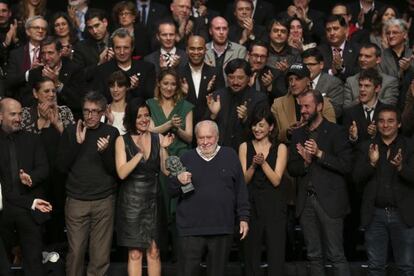Filmmaker Jaime de Armiñán receives honorary Goya Award
This year’s nominees applaud 86-year-old at pre-gala gathering

Eighty-six-year-old Jaime de Armiñán was the big star at the traditional pre-Goya Awards gathering in Madrid this week. Surrounded by many of the nominees for this year’s prizes, which will be given out on February 9, the director of the Oscar-nominated My Dearest Señorita (1972) and The Nest (1980) received a lifetime achievement award at the ceremony hosted by actress and TV presenter Cayetana Guillén Cuervo.
“I’m nervous because presenting to Jaime de Armiñán is an honor,” began Academy President Enrique González Macho. His presentation highlighted the kind humor and intelligence of Armiñán’s films. “Out of the whole auditorium, Jaime, you are the youngest. You’ve always said that prizes don’t change anything; it’s true. But your films have done so. Thank you very much for the cinema you have gifted us,” he concluded.
Armiñán, who received the award from actress Julia Gutiérrez Caba as the audience in the Teatros de Canal rose to give him a standing ovation, expressed his wish that all the Goya nominees would reap prizes, money, joy and love. Rather than talk about his films in his acceptance speech, he spoke of his feelings about cinema, but most of all about other art forms such as the circus, which he said was the seed of theater and the movies. “If this was a bullring, I would like to do a tour of the arena,” he finished off.
Armiñán first found success with his third film My Dearest Señorita, one of the first Spanish movies to tackle the then-controversial issue of sexual identity. Co-written with fellow director José Luis Borau, it stars José Luis López Vázquez as a spinster in a small town who discovers she is actually a man and moves to Madrid to begin a new life. It was nominated for the Oscar for Best Foreign Language Film in 1972, a feat Armiñán would repeat eight years later with The Nest.
In his welcome speech González Macho praised the vitality and talent of Spanish cinema in these times of serious economic difficulties and saluted this year’s nominees who, he said, had made “wonderful films.” He also found room for some veiled criticism of the government: “Despite the obstacles they put in our way from time to time, Spanish cinema is more than alive, not just because of the films represented here today but also because of very many others,” he said. “They will never take talent and creativity away from us.”
Tu suscripción se está usando en otro dispositivo
¿Quieres añadir otro usuario a tu suscripción?
Si continúas leyendo en este dispositivo, no se podrá leer en el otro.
FlechaTu suscripción se está usando en otro dispositivo y solo puedes acceder a EL PAÍS desde un dispositivo a la vez.
Si quieres compartir tu cuenta, cambia tu suscripción a la modalidad Premium, así podrás añadir otro usuario. Cada uno accederá con su propia cuenta de email, lo que os permitirá personalizar vuestra experiencia en EL PAÍS.
¿Tienes una suscripción de empresa? Accede aquí para contratar más cuentas.
En el caso de no saber quién está usando tu cuenta, te recomendamos cambiar tu contraseña aquí.
Si decides continuar compartiendo tu cuenta, este mensaje se mostrará en tu dispositivo y en el de la otra persona que está usando tu cuenta de forma indefinida, afectando a tu experiencia de lectura. Puedes consultar aquí los términos y condiciones de la suscripción digital.








































